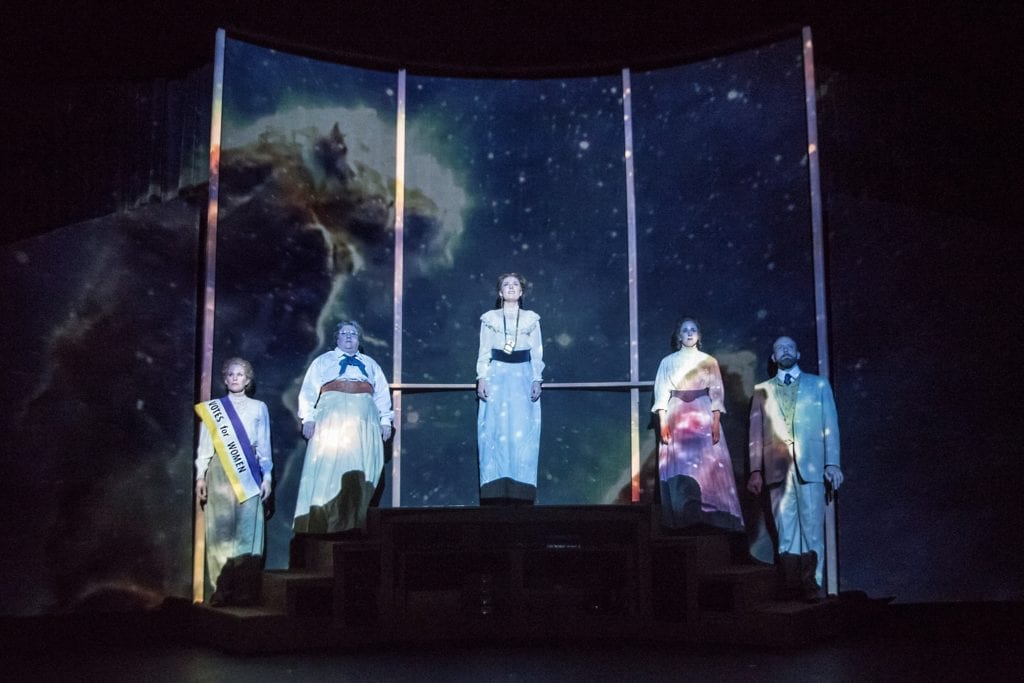
By Lisa Kennedy (Read the original.)
Celebrated playwright Gunderson’s “Silent Sky” looks up to an astronomer who was ahead of her time
It would not be overstating it to say that Henrietta Leavitt had a twinkle in her eye. Heck, it’s not even hyperbole to say she had millions of them.
While working at the Harvard College Observatory in the early 20thcentury, Leavitt — the central figure in Lauren Gunderson’s “Silent Sky” — looked at photographic plates of the solar system and made an enduring find.
The daughter of a Congregational Church minister, Leavitt’s 1908 discovery of the period-luminosity relation in pulsing Celpheids was instrumental to measuring intergalactic distances.
You don’t have to see the Boulder Ensemble Theatre Company’s often shimmering regional premiere in concert with the exhilarating film “Hidden Figures” or Curious Theatre Company’s “Constellations,” about the meeting and meeting and meeting of a theoretical physicist gal and a bee-keeping guy. The play stands on its own.
But if you were to binge, encouraging patterns might emerge. Writing with spark and gravity, Gunderson adds to the deepening depiction of female smarty pants who advance the sciences. (A bonus to those of you who saw Tira Palmquist’s climate scientist-centered “Two Degrees” at the Denver Center earlier this year.)
“Silent Sky” opens with Henrietta (Anastasia Davidson) telling her beloved sister Margaret that she plans to leave the family’s Wisconsin home for the Harvard College Observatory. Though Henrietta’s starry pursuit may feel like abandonment, Margaret (Rachel Turner) encourages her nonetheless.
Tina Anderson’s efficient, elegant set transports us to the observatory, to the deck of an ocean liner and back to Wisconsin, where Margie tends to their father’s ministry, gets married, has a son and modestly explores her own creative desires. Projection designer Brian Freeland creates a marvelous sweep of constellations as the play’s dynamic backdrop. Ahh.
In addition to Leavitt, the play introduces two significant figures in the history of American astronomy: Annie Cannon and Williamina Fleming. They, too, began their careers under observatory director Edward Charles Pickering as “computers.”
Leslie O’Carroll nestles quite comfortably into Fleming’s Scottish brogue and tart good humor. As for Cannon — who went on to become the first female officer in the American Astronomical Society — Karen Lamoureaux depicts a woman whose interpersonal chill has a great deal to do with the rules of engagement in the sciences.
There’s no need to fret about merely being edified by the material. Director Kate Folkins and the cast inject warm and wry observations in the midst of the brainy. Easy laughs shift into something more tender as Pickering’s rather ramrod apprentice, Peter Shaw (Austin Terrell), makes his “rounds.” His increasingly frequent visits strike Cannon and Fleming as amusingly suspect. And audiences might wonder if there’s not a bit more to Fleming and Cannon’s Mutt-and-Jeff vibe than the habitual rhythms of longtime colleagues.
Currently, Gunderson is the second most-produced playwright in the country, after August Wilson. Earlier this year, her quick-witted delight, “The Book of Will,” had its world premiere at the Denver Center and has already made its way into a number of 2017-18 seasons.For its part, the Boulder Ensemble will launch its 2017-18 season with the playwright’s “The Revolutionists,” about four women during France’s Reign of Terror.
“Silent Sky” offers insights into why Gunderson is so produced at this moment. Her plays are sharply researched and learned while doggedly getting at the terrifically human and cultural thorns.
In reading up on this powerhouse trio of so-called “Pickering’s Women,” it’s clear any one of them would have made a fine protagonist. Seizing on Leavitt, however, allowed Gunderson a chance to tease a relationship that bedevils us perhaps now more than it did those gathered at Harvard during the time the play is set in: the divide between science and religion. It also allowed Gunderson to thread one of her grandmother’s favorite hymns, which Margaret reprises throughout the play: “For the Beauty of the Earth.”
Henrietta didn’t run away from home and roots. She ran toward a calling. In portraying her, Davidson captures Henrietta’s ache to uncover the patterns of the universe. She also makes palpable the astronomer’s — and ours — enduring awe at an inky night perforated with stars.
3 stars. “Silent Sky.” Written by Lauren Gunderson. Directed by Kate Folkins. Featuring Anastasia Davidson, Karen Lamoureaux, Leslie O’Carroll, Austin Terrell and Rachel Turner. Through April 30, at the Dairy Arts Center, Walnut Street, Boulder. www.betc.org or 303-444-7328.
